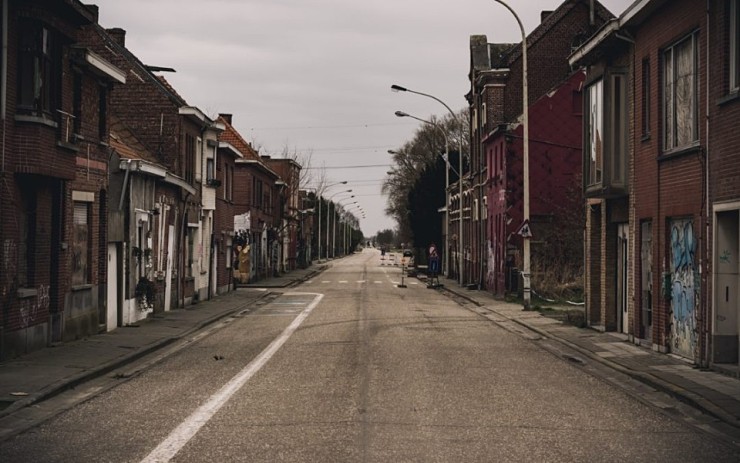European suburban and metropolitan areas have been suffering from the high home vacancy rates for a long time. The European real estate market has shown signs of overheating, with housing prices soaring 30 to 40 percent in major countries and cities over the past five years. On December 17, 2019, the New York Times reported that the risk of a real estate bubble is increasing due to Europe’s ultra-low interest rates. With rising housing prices and monthly rents, residents in some major cities are being forced to move to suburban areas. However, in some suburban areas of Europe, more and more people are moving to metropolitan regions, seeking greater employment opportunities, worsening the empty housing problems being felt in the suburbs. In rural areas of Switzerland, such as cantons Jura or Ticino, it is common to find vacant newly constructed buildings. Even worse, some houses are left for so long, they are eventually ruined. This is because people have left for bigger cities and also because of the construction boom being experienced in the European countryside in recent years. Private investors keen to make a profit even if building a new home in the wrong area is inefficient both from an economic standpoint and sustainable development principle, keep building houses as long as real estate prices keep rising in Switzerland.
Meanwhile, in the big cities of Europe such as London and Paris, the number of empty houses that are mostly owned by rich foreigners has been increasing since 2014. The fundamental problem is that the affluent investors consider the house as a means of commercial investment rather than for the purposes of dwelling. Since the wealthy foreigners buy high-priced houses mainly for investment purposes, these houses are often left empty or used as their villas instead of bringing in tenants. It causes real estate prices to rise abnormally, making it hard for residents to find reasonably priced housing in downtown areas. While the rich investors buy the houses for profit, ordinary citizens who can’t compete with market prices are driven out to the suburbs, worsening the polarization of housing as well as the vacant housing problems. For instance, there were about 220,000 empty houses in the countryside of London in 2019. Most of them were built for investment purposes instead of residential purposes during the bubble economy years of 2004 to 2008. The buyers are leaving the house empty for nearly five to six years, waiting for housing prices to rise again so that they can earn investment returns by reselling the house. Hundreds of thousands of houses were also demolished again to prevent real estate prices from falling due to excessive supply. As the implications of these zero economies attack the provincial cities where economic conditions are already vulnerable, each local government is fighting the problem of decreasing population in their own unique manner.
 |
| ▲ 1. In the UK, more than 200,000 houses are left empty for over six months, worsening the empty house problem. (Photo from sirseurope.co.uk) |
In some regions, the government is encouraging citizens to buy houses in suburban areas. In the past, Liverpool, England represented the British industrial complex. But many people left for London as the industries changed, which is a reason why the numbers on vacant houses increased in Liverpool. In response, the local government made it possible to buy an old empty house in the town for only 1 pound. This is not only happening in the UK, but also in many other parts of Europe, as a form of residential welfare. The city of Vivona in Sicily is not only selling homes for one euro, but also reducing the number of vacancies by offering various tax breaks to potential residents. In addition, there is a website where tenants can find homes for sale for one euro.
The phenomenon of increasing vacancies in metropolitan cities is not because of excessive housing supplies, but rather because there is a price gap between suppliers and buyers that is driven by investors that have no intention of living in their investment properties. Therefore, the government is trying to eliminate the problem, by increasing supply. The British government is implementing a policy to raise the holding tax by 50% if a house is left empty for more than 2 years. In addition, 56,000 empty houses in London are being provided to the homeless. At the same time, the government is repurposing old buildings for use as additional affordable housing.
Many European countries view the issue of empty houses as a serious social problem and not just a decrease in the number of local residents. They understand that over time, total demand is going to shrink, gradually affecting the local economy. If these vacant areas continue to increase, it will have a negative impact on the gross national product of the economy. Above all, it is necessary to develop a balance between life in metropolitan cities and rural areas.
 |
| ▲ 2. There are so many houses in Italy that sell for only one euro. There are even professional websites that sell a one-euro house. (From CNN travel) |
박근후, 남윤경 dankookherald@gmail.com

![[Campus Magnifier] Let's Surf the Library!](/news/photo/202404/12496_1765_4143.jpg) [Campus Magnifier] Let's Surf the Library!
[Campus Magnifier] Let's Surf the Library!
![[Campus Magnifier] Let's Surf the Library!](/news/thumbnail/202404/12496_1765_4143_v150.jpg)





